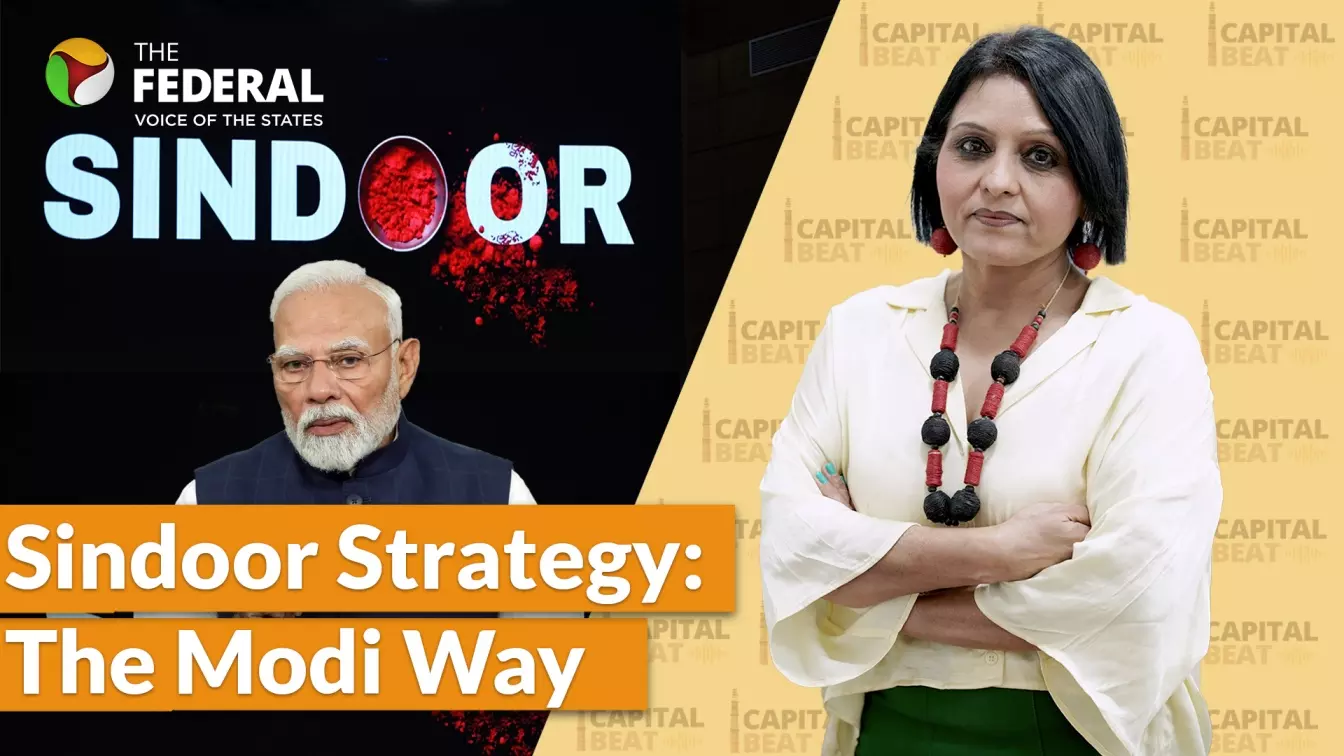
The Sindoor strategy: Is BJP shaping Bihar elections?
PM Modi invokes 'hot sindoor' to hail anti-terror strikes in Pakistan. Is he turning Operation Sindoor into a political weapon ahead of Bihar elections?

In this episode of Capital Beat, Neelu Vyas hosts a panel featuring Subhashini Ali, T K Rajalakshmi, and Wing Commander Anuma Acharya (Retd) to dissect the political and social fallout of Prime Minister Narendra Modi’s recent remarks in Bikaner. Claiming that "hot sindoor flows in his veins", Modi hailed the demolition of nine terror camps in Pakistan following Operation Sindoor.
Also read: India will never give in to nuclear blackmail, says Jaishankar
While the BJP portrays it as a bold patriotic assertion, critics question whether this is another attempt to politicise military action and emotionally sway voters, especially ahead of the Bihar elections.
Gendered symbolism
Ali minced no words, calling Modi’s Sindoor reference deeply objectionable.
“It demeans women, uses their sorrow, and turns trauma into political marketing,” she said.
Also read: India to build strong case to put Pak in FATF ‘grey list’, block World Bank fund
She flagged the BJP’s historical alignment with Manusmriti values, accusing the party of deploying gendered religious symbolism to both attract sympathy and stoke emotion. Ali pointed out that women who expressed calls for peace, such as widows of Pulwama victims or army spokespersons, were viciously trolled by Modi supporters.
“Women can be thrown to the wolves as and when needed,” Ali said, criticising the BJP for not defending trolled women like Himanshi Narwal or Aarti Menon.
Selective outrage
Rajalakshmi echoed these concerns, emphasising how sindoor is being "instrumentalised" to appeal selectively to Hindu women.
Also read: ‘When Sindoor turns into barood…’: PM Modi’s top 6 quotes in Rajasthan rally
“This short-sighted symbolism only serves electoral goals. It’s a communal, narrow appeal,” she noted.
She questioned why the government remains passive when women from minority communities or dissenters are targeted. “Where was the outrage for Bilkis Bano or women facing dowry deaths?” she asked, highlighting the hypocrisy.
Rajalakshmi warned that while the symbolism might resonate initially, it could fade like past campaigns such as Article 370 or the Ayodhya temple.
Political optics vs ground reality
Acharya, Congress spokesperson and retired Wing Commander, noted that the BJP's emotional narrative may be falling flat this time.
“Even sabjiwalas and vendors are asking why the PM agreed to a ceasefire,” she said.
Acharya called the sindoor narrative "cheap emotional exploitation" and highlighted that PM Modi's glorified speeches contrast sharply with the ground realities of women’s safety and pending women’s reservation Bills.
“Crimes against women are normalised, and real justice is nowhere,” she said. “But yes, this time the people are seeing through the drama.”
Narrative control and Opposition response
The panel acknowledged the BJP’s likely intent to milk Operation Sindoor politically until the Bihar elections. With pro-Modi media amplifying his imagery and language, the Opposition faces a tough messaging battle.
“Each time the Opposition questions ceasefire logic, they’re branded pro-Pakistan,” noted the host.
Acharya asserted that the Congress is on the ground with campaigns like Jai Hind Sabha, engaging ex-servicemen and voters directly.
“We’re taking these questions to the people, not just raising them from Delhi pressers,” she said.
Secularism and state contradictions
Ali drew attention to the paradox at the heart of the BJP’s current messaging.
“You use secular icons like Kashmiri civilians and Muslim women abroad to build credibility, but target them at home,” she said.
Ali stressed that India’s real strength lies in its secularism and diversity, not in religious or gender-based symbolism.
“It’s secularism that makes India united. And it’s that very foundation the BJP is undermining,” she warned.
Emotional appeals or electoral fatigue?
Rajalakshmi concluded by casting doubt on the long-term effect of these symbolic campaigns.
“BJP tried emotional triggers in 2019 and 2024. Ram Mandir didn’t move the needle much. Will sindoor fare better?” she asked.
She pointed out that Modi’s speech might serve short-term headlines, but public focus is shifting back to real issues — jobs, inflation, education, and governance.
“There’s a saturation point. People are not blind anymore,” she concluded.
(The content above has been generated using a fine-tuned AI model. To ensure accuracy, quality, and editorial integrity, we employ a Human-In-The-Loop (HITL) process. While AI assists in creating the initial draft, our experienced editorial team carefully reviews, edits, and refines the content before publication. At The Federal, we combine the efficiency of AI with the expertise of human editors to deliver reliable and insightful journalism.)

